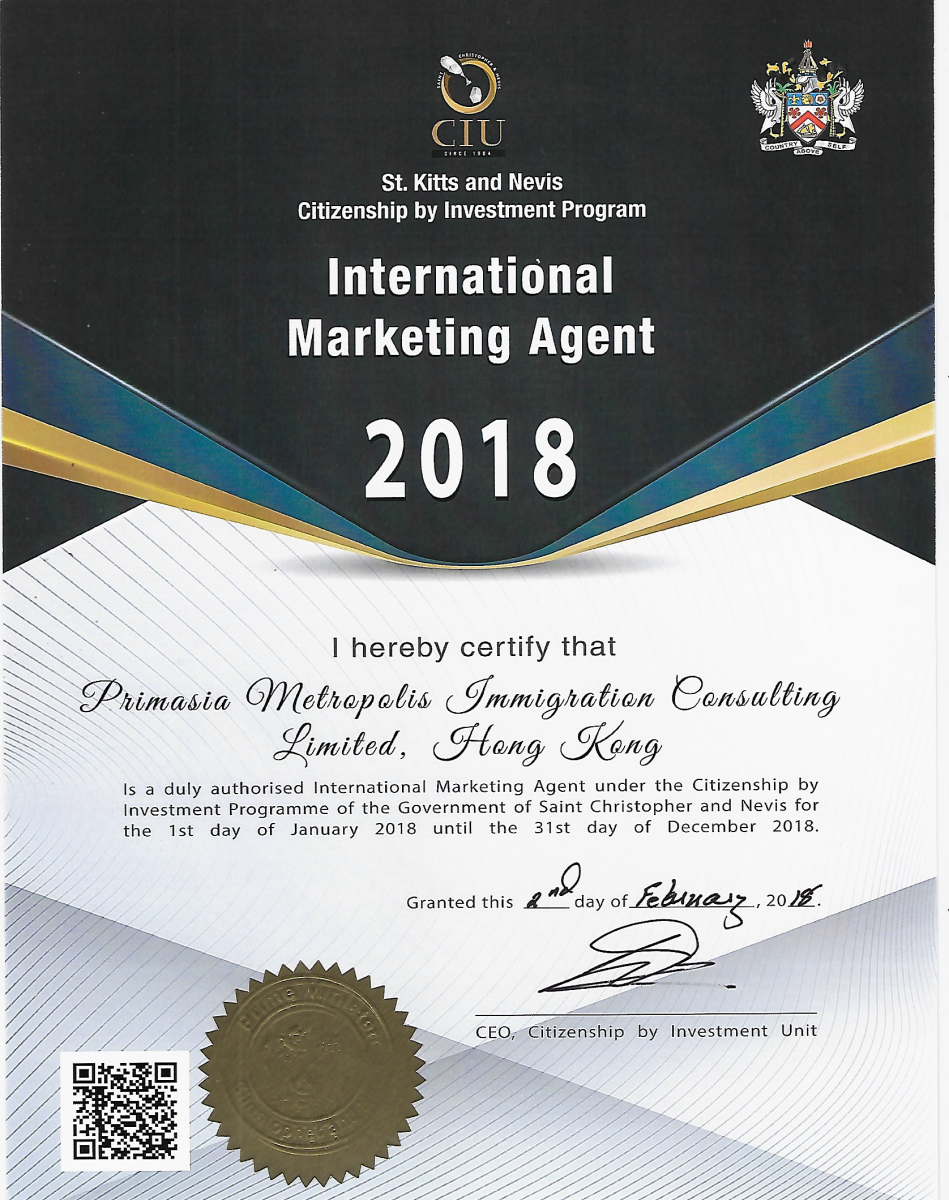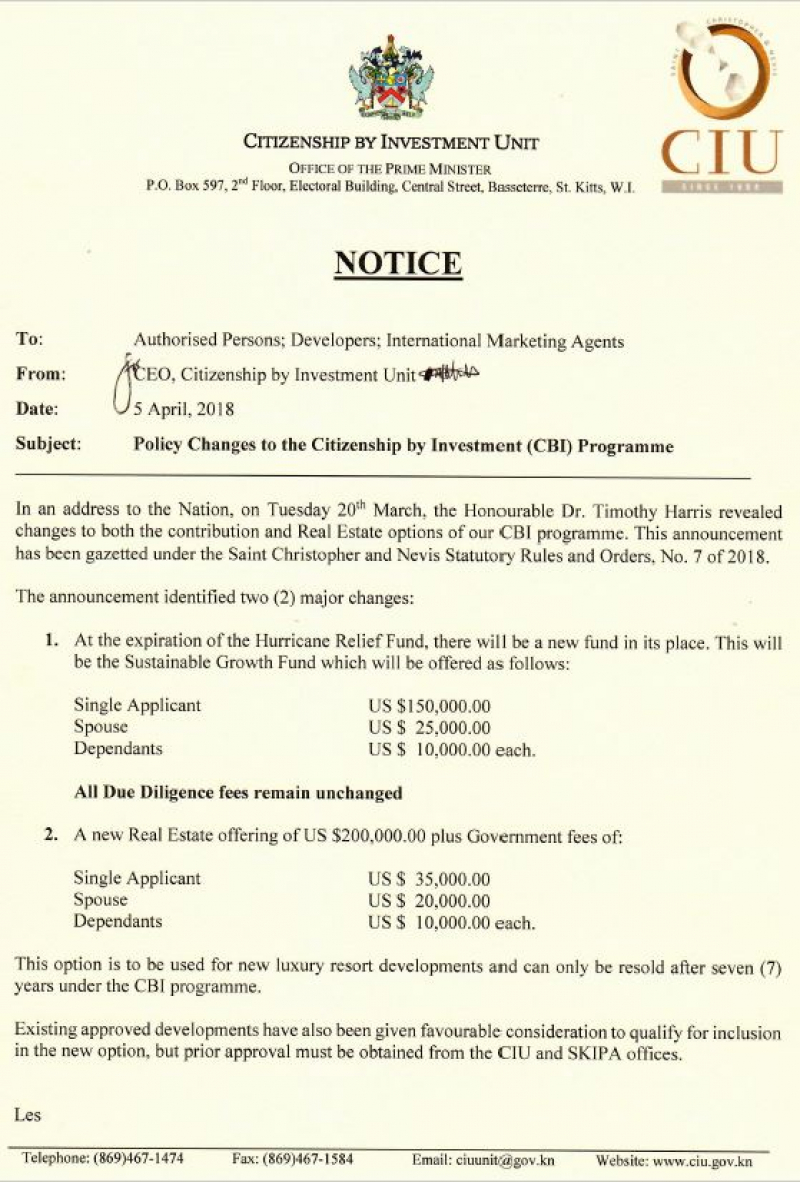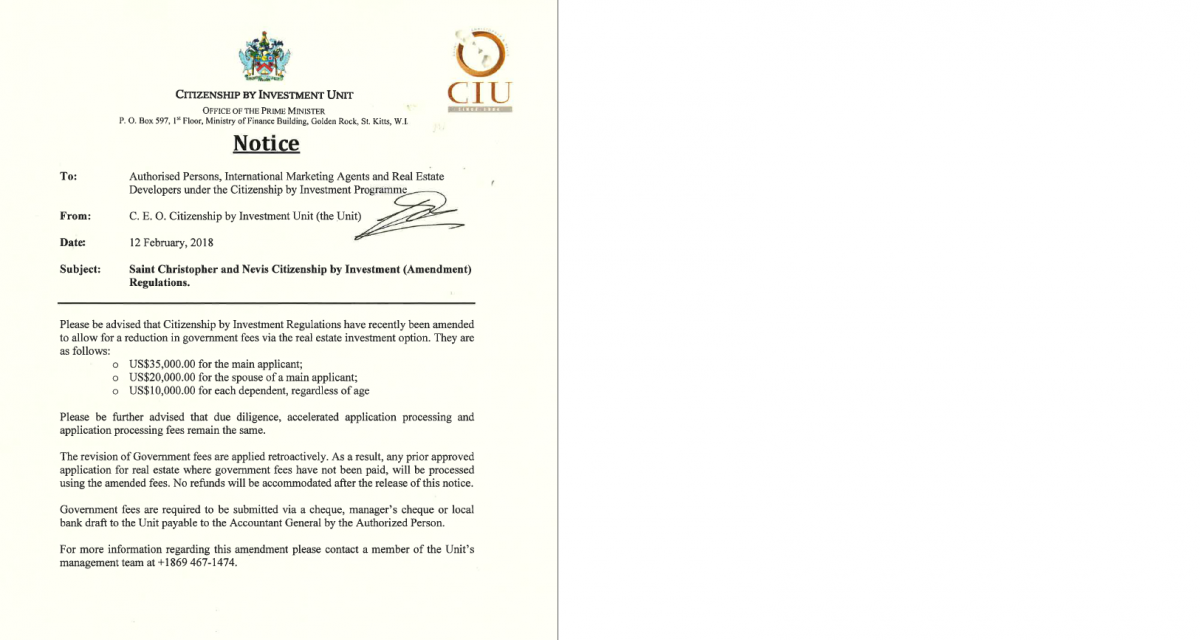
Tag Archives: Citizenship
St. Kitts Citizenship By Investment Donation and Real Estate options new thresholds with immediate effect
Donation Option:
(a) Principal Applicant US$150,000
(b) Spouse US$25,000
(c) US$10,000.00 for each dependent of the main applicant who is over the age of sixteen years
Real Estate Option
A new Real Estate offer of US$200,000 where it can only be resold after 7 years.
The existing US$400,000 option is still available and can be resold after 5 years.

The More CIP Countries, the Better For the Industry, Says Mohammed Asaria in Interview
Source: Investment Migration Insider
https://www.imidaily.com/caribbean/cip-countries-better-industry-says-mohammed-asaria-interview/
Author: Christian Henrik Nesheim
Vice Chairman of Range Developments, Mohammed Asaria, tells Investment Migration Insider in an interview that the introduction of more countries to the citizenship by investment market will keep countries “on their toes” and compel them to refine their product.
Range Developments is the firm behind the winner of Caribbean Travel Awards’ “Best New Hotel in the Caribbean” Prize, the Saint Kitts Park Hyatt, and is also developing the Cabrits Resort by Kempinski in Dominica (about halfway completed) as well as the Black Bay Resort by Ritz Carlton, scheduled for completion in 2021.
Citizenship by Investment Caribbean / Dominica Real Estate

REAL ESTATE
To qualify for citizenship of Dominica under the Real Estate Option of the Citizenship by Investment Programme, an applicant must purchase authorized real estate to the minimum value of USD 200,000.
On approval in principle of an application through a real estate investment or other approved project, the following fees also apply:
- USD 25,000 for the Main Applicant;
- USD 35,000 for the Main Applicant applying with his or her spouse;
- USD 35,000 for a family of up to four persons, including the Main Applicant and up to three dependants
- USD 50,000 for a family of up to six persons, including the Main Applicant and up to five dependants; or
- USD 70,000 for a family of seven persons or more, including the Main Applicant and six or more dependants
For a full breakdown of the other fees payable under the Real Estate Option, including due diligence fees
The real estate must be held for 3 years and may be eligible for re-sale under the Citizenship by Investment Programme after 5 years from the grant of citizenship.
Link : http://cbiu.gov.dm/investment-opportunities/real-estate/
Citizenship Bill Receives Royal Assent
News Release
From Immigration, Refugees and Citizenship Canada
June 19, 2017 – Ottawa, ON – Today, Bill C-6, an Act to amend the Citizenship Act and make consequential amendments to another Act, received Royal Assent.
Changes to the Citizenship Act reflect the Government’s commitments to streamline the citizenship process, enhance program integrity, and repeal certain provisions of the Act that treated dual citizens differently than other Canadians. Some changes to the Citizenship Act take effect immediately upon Royal Assent, while others take effect at later dates to ensure the necessary regulatory changes and departmental preparations are in place for a smooth transition for applicants.
As of today, applicants are no longer required to intend to continue to live in Canada once granted citizenship, providing more flexibility to Canadians who may need to live outside of Canada for work or personal reasons. Immediate changes also include repealing the ability to revoke citizenship from dual citizens convicted of crimes against the national interest. Dual citizens living in Canada who are convicted of these crimes will face the Canadian justice system, like other Canadian citizens who break the law.
Some of the changes that are expected to take effect later this fall will give more flexibility to both younger and older eligible immigrants to obtain citizenship. These changes include reducing the time permanent residents must be physically present in Canada to three out of five years, instead of four out of six years, before applying for citizenship; amending the age range for people to meet the language and knowledge requirements for citizenship from 14-64 years to 18-54 years; and counting some of the time applicants spend in Canada as temporary residents or protected persons toward their physical presence requirements for citizenship.
Other changes that are expected to take effect next year include strengthening the citizenship revocation process by having the Federal Court as the decision-maker on most cases, thereby enhancing the procedural fairness of the process. For a complete list of changes made to the Citizenship Act and when they take effect, please read the Bill C-6 Backgrounder.
Quotes
“Canada’s identity has always been shaped by the significant economic, cultural and social contributions of immigrants. Changes to the Citizenship Act will enhance program integrity, while giving more flexibility to eligible applicants to meet the requirements for citizenship so that they can continue building successful lives in Canada.”
The Honourable Ahmed Hussen, Minister of Immigration, Refugees and Citizenship
Related Products
Bill C-6 Receives Royal Assent
Backgrounder
From Immigration, Refugees and Citizenship Canada
Bill C-6, an Act to amend the Citizenship Act and make consequential amendments to another Act, received Royal Assent on June 19, 2017. This chart explains the changes that have been made to the Citizenship Act and indicates when these changes are expected to come into force, please read the Bill C-6 Backgrounder.
Link: https://www.canada.ca/en/immigration-refugees-citizenship/news/2017/06/citizenship_billreceivesroyalassent.html
Link: https://www.canada.ca/en/immigration-refugees-citizenship/news/2017/06/bill_c-6_receivesroyalassent0.html
Turnbull Announces Tougher Citizenship Laws for Australia
- More rigorous citizenship test
- Possession of domestic violence and organized crime history can not be naturalized;
- All applicants must show the steps they have taken to integrate into and contribute to the Australian community (evidence of employment, membership of community organisations, school enrolment for all eligible children);
- Strict English tests, including reading, writing and listening; New citizens will need to show strong English-language skills;
- Permanent residents waiting period from one year to four years
In addition, applicants must stay in Australia for four years before they can apply for naturalization, three more years – up from 12 months now.
“Australian citizenship should be honoured, cherished. It is a privilege.” The prime minister said.
Applicants will only be allowed to fail the citizenship test three times. Need to wait two years to retry.
The new measures will take effect today. Later this year Congress would passed the amendment to trace all new applications from today.
PMIC becomes International Marketing Agent of SKN Citizenship by Investment Applications


Primasia Metropolis Immigration Consulting Limited is now one of the eight official International Marketing Agents of SKN Citizenship by Investment applications.
Link: http://www.ciu.gov.kn/agents/international-marketing-agents/
Subtle but key differences in Caribbean citizenship programmes
Subtle but key differences in Caribbean citizenship programmes (updated on 23032017)
By Caribbean News Now contributor
MIAMI, USA — It is often tempting to lump together the five citizenship by investment (CBI) programmes of the Eastern Caribbean, with investors assuming that the only difference is the reputation of the island or the price of the passport. This is clearly not the case. While they often share many similarities, not all are created equal.
For example:
1. Saint Lucia citizenship cannot be passed down to future generations, but is limited to the applicants at the time the application is made – so it is not true citizenship, more like residency. This is not the case in Dominica, where full citizenship is passed from parent to child indefinitely.
2. St Kitts and Nevis’s big advantage, shared by Saint Lucia, is that it does not maintain diplomatic relations with China, preferring many years ago to partner with Taiwan instead. As a result, the Chinese love these passports as they feel safer with the Taiwanese. This is an important issue with Antigua and Barbuda, which is very close to China – it built the Sir Vivian Richards cricket stadium among other things – so there is always a perceived risk for Chinese investors that their new citizenship will be revealed to their home government.
3. Dominica and St Kitts and Nevis’s other big advantage is that real estate can be sold after five years to investors who can also use the same piece of real estate to apply for CBI. This is not the case with Antigua and Barbuda or Grenada. In the case of the former, it can only be resold (if the applicant wishes to keep the passport), the project is complete and given progress to date.
4. Grenada’s much-touted selling point is its E-2 investor visa treaty with the United States. The E-2 investor visa allows an individual to enter and work in the US based on an investment he or she will be controlling. This visa must generally be renewed every two years, but there is no limit to how many times one can renew. The investment must be “substantial”. Investor visas are available only to citizens of certain countries, including Grenada. However, applicants must hold a Grenadian passport to apply for this visa but, in order for the E-2 visa to be granted, applicants first have to visit the US embassy in Bridgetown, Barbados, and explain their business plan. Officials there are said to baulk at any applicant, who, though they might be holding a Grenadian passport, does not look Grenadian.
Link : http://www.caribbeannewsnow.com/headline-Subtle-but-key-differences-in-Caribbean-citizenship-programmes-33872.html
Government of Canada delivering faster processing and shorter wait times for spousal reunification
At the direction of the Minister, earlier this year Immigration, Refugees and Citizenship Canada (IRCC) began a concerted effort to reduce processing times. From the start of 2016 to the fall, processing times were reduced by 15 percent for in-Canada applications and just over 10 percent for applications outside Canada.
Starting today, processing times will be reduced even further with most spousal applications now being processed in 12 months. Complex cases may require more time.
Applicants who already filed an application will not have to wait an additional 12 months to have them finalized. IRCC will continue to process applications in the order they have been received. Most families who have been waiting should have a decision on their sponsorship application no later than the end of December 2017.
These new changes are expected to benefit more than 64 000 applicants by the end of 2017, and are the latest measures to bring families together.
Quote
“We have listened to Canadians and are delivering results. Bringing families together makes for a stronger Canada. Canadians who marry someone from abroad shouldn’t have to wait for years to have them immigrate or be left with uncertainty in terms of their ability to stay. What we’re announcing today is a more efficient, more considerate process to reunite families.”
– The Honourable John McCallum, Minister of Immigration, Refugees and Citizenship
Quick facts
- The application kit for new sponsors has been redesigned to be simpler and easier to understand. It will be available on December 15, 2016.
- To bring families together, IRCC plans to admit 64 000 spouses and dependants in 2017, well above the average over the past decade of about 47 000.
Link: http://news.gc.ca/web/article-en.do?nid=1166069









